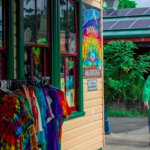Police Power More Present than Ever at Nimbin Mardi Grass Festival

The New Wales Police Force has been at the frontline of the state Government’s crackdown on music festivals this year, with substantial funds being allocated to ensure the events are heavily policed.
The Nimbin Mardi Grass was no exception. The small town on the far northern coast of the state hosts the festival every year. It began in 1993 as a protest against drug laws, but has steadily grown in popularity and now includes a celebration of all things cannabis.
With the global tide turning in favour of the legalisation of recreational cannabis possession and use, and murmurings in various states around Australia which suggest some state governments will also consider legalising it, the festival’s original aim now seems far less futile than it was even several years ago.
Strong police presence in Nimbin
But the police presence this year was stronger than ever in the small town not far from Byron Bay, in both the lead up to, and during the festival itself.
The day before the festival police raided the Hemp Embassy, confiscating about 7.5 kilograms of cannabis leaf, along with around 500 pre-rolled joints.
During the festival, police reportedly conducted random searches on patrons and 90 people were found to have drugs, 45 were fined, cautioned or charged as a result.
2,408 mobile drug tests were conducted within 30km of the festival site and 68 drivers were arrested for secondary testing.
New South Greens MP David Shoebridge questioned the spending in Parliament in May. According to the answer he received from the State Emergency Services Minister, 133 police attended the 2019 Nimbin Mardi Grass, spending a total of 2,036 hours on the event.
Cost to taxpayers
While Mardi Grass organisers were not required to pay for the police presence, the man hours add up to more than $250,000.
The Greens Party, which has long been at the forefront of the push for pill testing, criticised the spending, which it says are a waste of police resources which could be better spent preventing and responding to domestic violence, white collar fraud and other ‘real’ crime.
“Instead, we have NSW police wasting over a quarter of a million dollars policing a festival that celebrates a drug that is legal in a growing number of places around the world,” says David Shoebridge. “These figures prove once again that the war on drugs is an expensive failure.”
Government repeatedly refuses to consider lternative options
Last year, the Greens plan to open 18-pill testing services across Australia was assessed by the Parliamentary Budget Office which put a cost on the initiative at $16 million.
But despite the numbers stacking up, and the research on pill testing proving an effective way for users to test substances before taking them and risking their lives, the New South Government remains steadfast in its refusal to introduce the idea.
Earlier this year, the Government released it’ list of ‘high risk’ festivals. Data provided by NSW Health shows that at least 66 young people were rushed from festivals by ambulances to emergency care and 20 had to be revived by on-site critical care teams and five people dies.
The Government’s response has been to issue a festival licencing programme, saturating festivals with a higher police presence and to provide police with broader ‘stop and search’ powers.
In addition, the Government has increased penalties for drink and drug driving, and also made a commitment to double the number of mobile drug testing units from 100,000 to 200,000 a year by 2020, despite overwhelming evidence that MDTU testing is unreliable. A New south Wales magistrate recently delivered a landmark ruling earlier this year that a female driver tested positive to cannabis as a result of ‘passive smoking’.
All of these ‘zero tolerance’ strategies come of course from the pockets of taxpayers, most of whom are in favour of both pill testing and cannabis being made legal, as it has been in other countries such as Canada with great success, removing stigmas and health risks, as well as regulating the cannabis industry and reducing crime linked to the black market trade in drugs.







